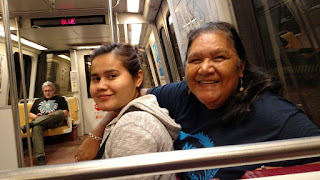Dolly Potts, Agricultural Research Intern
Nov. 9, 2017
I traveled to Washington, D.C. on November 10 for my first First Americans Land-Grant Consortium (FALCON) conference
to present my poster and presentation on traditional gardening and gathering. My trip
proved to be a reminiscent and new experience for me. The last time I was in
Washington D.C. was in 1978 with AIM (American Indian Movement) Longest Walk. The recent passing of long-time AIM activist, Dennis Banks made the trip very special. The
walk was to make the country aware of the many broken treaties and the bad conditions
on Indian reservations. Natives walked across the United States starting at
Alcatraz in the San Francisco to Washington D.C. Everyone joined the walk from
reservations along the route, I joined in Kansas. I
visited some of the sites the group camped around while waiting for government
officials to meet with us in 1978. The meeting never happened and the increased
security in the nation's capital on this trip made me aware of how much things have changed.
The conference was great; we visited with a number of
students who were involved in agricultural projects like ours. One of the groups
was raising Bear Island Flint corn. Another had transitioned to raised beds and wanted
to know more about the amendments we used in our garden. Everyone was very interested in how our
project blended the traditional aspect with the scientific aspect. One of the
participants talked about gathering as an important part of native culture. She gathered
sixteen plants that were edible or had medicinal properties around the outside of the hotel. Remember, we were
in downtown Washington, D.C.! She then proceeded to make a tea out of a few of the plants and it was delicious.
I left the conference proud of the College of Menominee
Nation Sustainable Development Institute agricultural project growing Bear
Island Flint Corn. I was very proud of the fact that the project has
successfully blended indigenous science with western science. I am most proud
of the fact that the project has brought back food that was grown and found in
the ancient Menominee garden beds. The project has revitalized gathering
practices and shared them with Menominee youth. This work has been a good
step toward food sovereignty for the Menominee community.












No comments:
Post a Comment